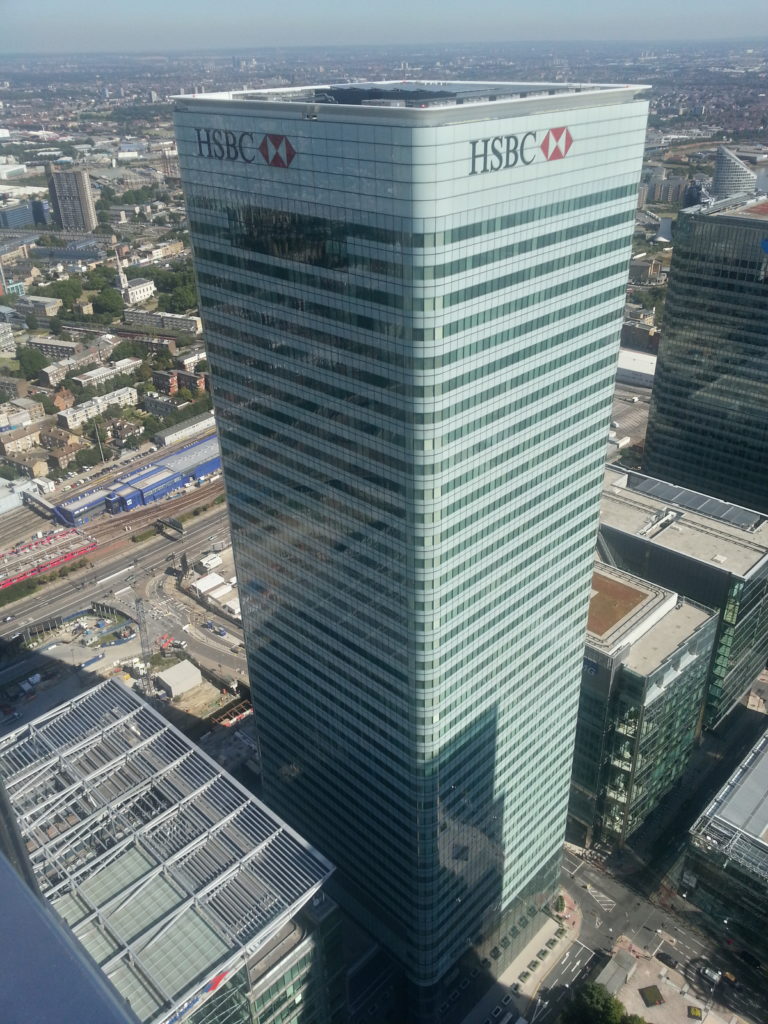The name Stewart Kirk is likely to become synonymous with crazy public outbursts, cancel culture and climate change denial but I think his presentation was an honest and heartfelt expression of HSBC’s de facto position. Of course, one cannot know for sure what Kirk’s motive was beyond what he actually said but for those of us practicing forensic sustainable and impactful investment analysis, Kirk’s presentation came as no surprise.
Until last week, Kirk was HSBC’s Head of Responsible Investment and Head of Research & Insights at the bank’s asset management division. He was suspended from his role after he made a presentation to the Financial Times Moral Money Summit entitled “Why investors need not worry about climate risk,” in which he argued that “climate change is not a financial risk that we need to worry about.” According to the FT, Kirk’s presentation “had been agreed two months earlier and publicised on the website in the run-up to the event.”
Despite this, Noel Quinn, HSBC’s group CEO, said on Linkedin, “I do not agree – at all – with the remarks made at last week’s FT Moral Money Summit. They are inconsistent with HSBC’s strategy and do not reflect the views of the senior leadership of HSBC or HSBC Asset Management. Our ambition is to be the leading bank supporting the global economy in the transition to net zero.”
Just how committed to net zero really are HSBC?

File:HSBC Building London.jpg – Wikimedia Commons
HSBC make very bold claims about their commitment to achieving net zero, both for their own organisation and for their customers. These are just a few snippets from their climate strategy:
“In October 2020, HSBC set out an ambitious plan to prioritise sustainable financing and investment that supports the global transition to a net zero carbon economy.”
“At the heart of our plan is an aim to align our financed emissions – emissions produced by our portfolio of customers – to the Paris Agreement goal of net zero by 2050 or sooner.”
“The Paris Agreement signed by global leaders in 2015 set a goal to limit the rise in the planet’s temperature to well below 2 degrees Celsius above pre-industrial levels by 2050. If that target is to be achieved, every organisation in the world has a part to play.”
“We’re also leading by example, setting ourselves a target to make our operations net zero by 2030 or sooner, and we’re working with suppliers to achieve the same goal in our supply chain. A lot of the work in this area will build on what we have achieved in recent years to cut carbon emissions and reduce our wider environmental impact. To accelerate the global transition to net zero, we also want to unlock climate solutions such as clean tech innovation, sustainable infrastructure, and nature-based solutions. Radical ideas are needed to tackle climate change but turning concepts into commercially viable solutions at a global scale requires investment and governance.”
What they don’t mention are the damning inconsistencies that Kirk’s presentation exposes, showing how little in reality HSBC care about achieving net zero.
For five crucial and extremely profitable years, HSBC ignored the Paris Agreement and the IPCC’s emphasis on 1.5ºc as a relatively safe limit beyond which the effects are likely to be disastrous. Then in late 2020 they set out their “plan to prioritise sustainable financing and investment that supports the global transition to a net zero carbon economy.”.
Their timing was exquisite. By October 2020 the bottom had fallen out of the fossil fuel market. The price of oil was on the floor and almost the entire world had ground to a halt, causing a surge in renewable energy stocks and creating a bubble in environmental markets. The writing was on the wall for fossil fuels, and this all came on the back of Extinction Rebellion’s highly successful global campaigning in 2018 and 2019.
What is even more damning is that HSBC is still investing in proposed new coal power plant developments, that when built, would generate 15 billion tonnes of CO2 over their lifetimes, equivalent to 32 years of UK emissions at current levels. Such levels completely undermine any chance of achieving the goals of the Paris Agreement. In total HSBC have invested some $111bn in fossil fuel projects since Paris in 2015.
This murky inconsistency between public presentation and reality is not uncommon in the investment world, with many organisations presenting themselves as pro-net-zero whilst at the same time undermining that position with significant financial support for continued fossil fuel exploration. Kirk was merely presenting HSBC reality.
Adaptation at the cost of mitigation
It’s worth bearing in mind that Kirk was also Head of Research & Insights at HSBC. So, we should take what he said seriously. The point when he says: “too much money [is] spent on climate mitigation and far too little on adaptation” is absolutely at the nub of his argument and it is commonplace in the conventional investment world. Mitigation is about trying our best to halt climate change. It’s about achieving net zero through changes to our activities, both commercial and private. Adaptation is about living with climate breakdown in a way that sees it as inevitable and unstoppable. Ultimately, we must do both. Without mitigation we will reach the tipping points, beyond which no amount of adaptation will work.
Who else is complicit?

Banks like HSBC and oil majors like Shell, supported by financial institutions including fund managers and banks who buy into their implausible net zero targets, are deliberately selling their impossible but attractive strategies as a way to keep everyone happy. At the same time, they are forecasting the profits they hope to make from adaptation as time runs out on any hope of mitigation. Take this statement made to us by a Dutch bank and investment manager, regarding their investment in Shell:
“The high level conclusion is that Shell was the first oil and gas major to come with a detailed Energy Transition Plan, which included detailed elements such as targets, decarbonization strategy, capital allocation, governance and reporting. It is one of the global climate oil and gas leaders. Has committed to be a net zero emission company by 2050 (absolute emissions), in line with IPCC 1.5C scenarios, including all relevant scopes (1, 2 and 3). In line with investors asks Shell has set a new target to halve absolute emissions from their operations and the energy they buy to run them by 2030 (Scope 1 and 2), compared with 2016 levels and on a net basis. Also they have moved away from the notion that they have to reduce emissions ‘in line with society’ and now they want to stay ahead. Shell is clearly one of the climate leaders and is expected to play an important role in the energy transition. Of course there are still additional steps to be taken by Shell to achieve the above mentioned goals. That is why we engage with the company on these topics and monitor the developments closely.”
In our view this is patent ‘greenwashing’ but it is a strategy widely employed as a reaction to governmental pressure and in response to so called engagement. The reality is that unless Shell ceases its activities as a fossil fuel company, then it will continue to be one of the world’s greatest contributors to global heating and a barrier to achieving net zero. Shell, despite their public posturing, can be under no illusion about that either. What makes the fund manager’s defence of Shell even more extraordinary is that Shell have known since at least the 1980’s about the devastating effects that their activities were having on the planet, but for 40 years have done absolutely nothing to address the problem. Instead, they deliberately covered up and obstructed climate action and lobbied against climate related legislation.
In October 2021, Global Climate Insights, a research consultancy, published a 2 part report into Royal Dutch Shell’s Greenhouse Gas Emissions strategy. Their very detailed and academic report laid bare the extent to which Shell’s strategy is likely to fail: “Does the company have a target to reduce absolute emissions in the next 10 years? No. While [Shell] has stated that it expects absolute emissions to have peaked in FY [Financial Year] 18 at 1.7 Gt CO2e p.a [Gigatonnes of CO2 equivalent per annum], it has not made any commitment that absolute emissions will reduce further from FY 20 levels in the next 10 years. In addition, our initial forecasts of RDS’ GHG [Shell’s greenhouse gas] emissions profile indicate that due to its plans to increase LNG [Liquid Natural Gas] and hydrogen production, it will be difficult for absolute emissions to be reduced (see section 1.3). Why does this matter? Emissions reduction in the next 10 years is critical in keeping warming to 1.5°C. The fundamental requirement of any climate transition strategy must be to reduce absolute emissions in the near term. Management and boards must approach the need to decarbonise with the same level of rigour and urgency as any other business risk or regulatory issue”
Simplistically, mitigation strategies are almost entirely costs to business and governments, taking no account for the long-term savings that mitigation brings. They are the immediate externalities of their business models. They are the pollution taxes, regulatory requirements, and legal constraints that government does not want to fund, and business (including investors) does not want to pay for because it means reduced margins and reduced dividends. As Kirk says in his presentation, who cares about 10 years down the line, let alone 30!
Equally simplistically, adaptation for its advocates, means near term business opportunities, increased sales, profitable competitive trading that will make businesses and their investors, including banks and financial institutions, to quote Kirk, “lots and lots and lots of money.” This then empowers governments to do very little, reduce taxation for their own populations and leave behind the parts of the world that didn’t grow rich burning fossil fuels over the last 200 years.
Does Kirk have a point?

Many will agree with Kirk’s views and, to be fair, there is a great deal to be learned from what he says. It’s a viewpoint that often explains the reality of the multinational corporate response to the climate crisis. But most of it is plain wrong or misleading.
In a Catch 22 moment, that despite it being catchy will probably not become known as the “Kirk Catch,” Kirk presents his analysis of “the number of incidences in all press around the world that use the expression ‘climate catastrophe’” and concludes that “the more the phrase ‘climate catastrophe’ is used around the world, the higher and higher and higher risk assets go … As the warnings become even graver, the more asset prices INCREASED in value.” According to Kirk “unsubstantiated, shrill, partisan, self-serving, apocalyptic warnings are ALWAYS wrong” but nonetheless lead to asset price appreciation, aka rising share markets. Leaving aside the lack of evidence presented by Kirk of any actual cause and effect, (remember that ice cream sales don’t cause hot summers unless you take into account CFC emitting fridges as a causal factor) if he is right, and his own view becomes the predominant one, then asset prices would fall in value. Is that what he wants? Clearly not.
His view that “The markets are crashing around our ears today for nothing to do with climate whatsoever” is also simply not true. A good deal of the current market woes is a direct result of climate related problems. According to The Economist, a magazine, “China, the largest wheat producer, has said that, after rains delayed planting last year, this crop may be its worst-ever. Now, in addition to the extreme temperatures in India, the world’s second-largest producer, a lack of rain threatens to sap yields in other breadbaskets, from America’s wheat belt to the Beauce region of France. The Horn of Africa is being ravaged by its worst drought in four decades. Welcome to the era of climate change. All this will have a grievous effect on the poor. Households in emerging economies spend 25% of their budgets on food—and in sub-Saharan Africa as much as 40%. In Egypt bread provides 30% of all calories. In many importing countries, governments cannot afford subsidies to increase the help to the poor, especially if they also import energy—another market in turmoil.” These events and the resulting shortages increase economic uncertainty and are extremely relevant to global market woes, but hey, who cares about that when we can adapt!
Kirk claims that “too much money [is] spent on climate mitigation and far too little on adaptation” and this is inextricably linked to his view of the transition as purely a financial opportunity, and not a solution to an existential threat. “Let’s get back to making money out of the transition because there are thousands of opportunities out there. We have a trillion-dollar car company that nobody at the FT predicted five years ago, including myself, and they’re the sort of opportunities that we need to invest in all around the world. I agree in the just transition, I agree with the opportunities that exist in all these facets of technology, but it’s a good thing, it’s nothing to be ashamed or scared about.”
Kirk v Thorne: who cares if it’s apocalypse now or never?

That adaptation is to the detriment and will lead to the complete annihilation of the liveable habitat of countries lying along the equator and between the Tropics, island nations and low-lying states, some of which are the poorest on the planet that lack the financial resources to adapt, isn’t a deliberate plan by Kirk and his fellow adaptors. They simply don’t care. In any event, governments are playing their part by introducing strict migration policies that will prepare countries in the global north for those inevitable consequences of travelling down the adaptation route.
The idea that this won’t lead to global conflict and the likely toppling of the current neoliberal, neocolonial system is becoming increasingly farfetched. Companies like HSBC and Shell, have to publicly and forcefully reject the views of people like Stuart Kirk, because if they allow the truth to come out too soon then it is likely that, globally, those who are educated and have moral and ethical views will reject the political parties, institutions and influential individuals, who have wilfully misled them for so long by supporting such a subtext. Then who knows what might happen!
You may think this is pretty far-fetched and to be fair, probably no one is really listening anyway.

Kirk was pretty clear on that: “I feel like it’s getting a little bit out of hand. The constant reminder that we are doomed, the constant reminder that within decades it’s all over, indeed Sharon [Sharon Thorne, Deloitte Global Board Chair] said we are not going to survive and indeed no one ran from the room, in fact most of you barely looked up from your mobile phones at the prospect of non-survival”. So, whilst the FT’s Moral Money delegates may have fallen asleep during “Sharon from Deloitte’s” doom laden apocalyptic delivery, they should have been sitting up taking notes for his…
Footnote: Sharon Thorne’s speech to the FT Moral Money Summit doesn’t appear to be available online but here is an online video presentation she made to the T20 Summit Indonesia in which she speaks eloquently about many aspects of climate change and what boards can do to help their companies achieve net zero.
